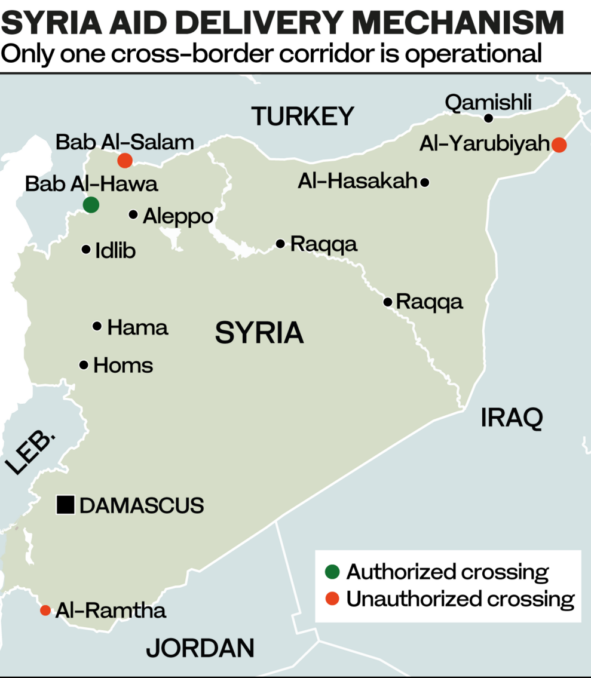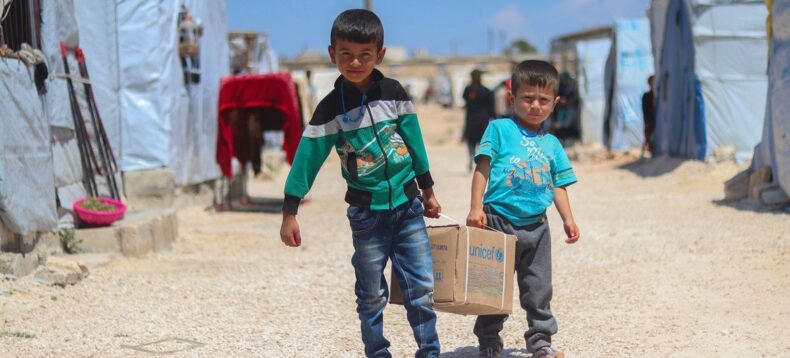Russia’s veto at the United Nations (UN) Security Council has signaled the demise of a long-running humanitarian operation in northwest Syria. The operation, which delivered aid to 4 million people in rebel-held areas, has come to an end after Russia vetoed a nine-month extension of the UN authorization. Russia’s own proposal for a six-month extension also failed to secure approval.
Russia’s UN Ambassador, Vassily Nebenzia, stated, “If our draft is not supported, then we can just go ahead and close down the cross-border mechanism.” This move has left the fate of the aid operation uncertain, raising concerns among aid groups and humanitarian organizations.
US Urges Russia to Reconsider and Work Towards Renewal
The US Ambassador to the UN, Linda Thomas-Greenfield, expressed disappointment over Russia’s veto and called on Russia to reconsider its position. She stated that the United States would continue to collaborate with all council members to renew the aid operation, emphasizing the importance of providing assistance to those in need.
Secretary-General Expresses Disappointment and Calls for Support
UN Secretary-General Antonio Guterres, who had advocated for a 12-month renewal, expressed disappointment that the council failed to reach an agreement. He urged all Security Council members to intensify their efforts in supporting the continuous delivery of cross-border assistance to the millions of people in dire need in northwest Syria.
Guterres’s spokesman, Stephane Dujarric, quoted the Secretary-General as saying, “to redouble their efforts to support the continued delivery of cross-border assistance to millions of people in dire need in northwest Syria for the longest possible period.”
Sovereignty Concerns and Contentious Security Council Votes
The need for authorization stems from the Syrian government’s concerns over sovereignty, as it has not agreed to the UN humanitarian operation in rebel-held areas. Security Council votes on this matter have historically been contentious, with mandates being renewed a day after expiration in 2022 and 2020.
Russia and Syria argue that the aid operation violates Syria’s sovereignty and territorial integrity. They propose that aid should be delivered from within the country, while opposition groups fear this would allow the government to control the distribution of aid, especially as Assad attempts to regain Syria’s international legitimacy.

Uncertain Future for Border Crossings and Humanitarian Aid
The fate of the border crossings used for aid delivery remains uncertain. Following a devastating earthquake in February, President Bashar al-Assad allowed the UN to use two additional border crossings from Turkey to deliver aid. However, it is unclear whether these approvals will be extended beyond the current deadline of August 13.
Syria’s UN Ambassador, Bassam Sabbagh, stated that Damascus would assess the situation and announce its position regarding the border crossings. Sabbagh emphasized that the authorization for the aid operation should only be extended for six months, criticizing the draft resolution for not reflecting the aspirations of the Syrian people.
Disappointment and Pleas for Unity
The Security Council vote drew disappointment from various parties. Only Russia and China voted in favor of Russia’s six-month extension proposal, while ten members abstained and the United States, Britain, and France voted against it. The failure to secure a resolution has been deemed a “sad moment for the Syrian people” by Ambassador Thomas-Greenfield, who characterized Russia’s veto as an act of “utter cruelty.”
France’s UN Ambassador, Nicolas De Riviere, called on all council members to demonstrate unity and responsibility and to pursue dialogue to renew this vital mechanism. The UN’s failure to renew the aid operation has drawn condemnation from the International Rescue Committee, which highlights the dire humanitarian needs in the region.
Future Prospects and the Impact on Northwest Syria

The Bab al-Hawa border crossing, responsible for 85% of UN aid to northwest Syria, faces the prospect of closure. Aid groups warn that the remaining two crossings, Bab al-Salameh and al-Rai, cannot match the volume of aid delivered through Bab al-Hawa. Despite the UN’s pre-positioning of supplies in the region, the halt in aid through Bab al-Hawa is expected to have significant consequences.
The situation in northwest Syria remains precarious, as millions of people are in dire need of humanitarian assistance. The hope now lies in renewed efforts by the Security Council to find a solution and support the continuous delivery of aid to the region.













